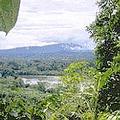 根據巴西政府發佈的數據顯示,亞馬遜地區森林消退速率已有減緩趨勢。自去(2005)年8月算起過去一年內,約有1萬3000平方公里的森林地被破壞,大約是前年同期消退速率的一半,且是自1988年以來第二低的紀錄。
根據巴西政府發佈的數據顯示,亞馬遜地區森林消退速率已有減緩趨勢。自去(2005)年8月算起過去一年內,約有1萬3000平方公里的森林地被破壞,大約是前年同期消退速率的一半,且是自1988年以來第二低的紀錄。
亞馬遜雨林占全世界雨林總量的一半,人們稱它為「世界之肺」,就是因為它可以不斷地行光合作用,轉換二氧化碳變成氧氣進入大氣中。專家一致認為:有五分之一的森林因農業及開發而砍伐殆盡,不過太空總署及WWF所估計的實際數字有異,分別為16%及17%。
亞馬遜地區有近250萬種昆蟲,數萬種植物,以及2000多種鳥類及哺乳類棲息於此。除了保護森林生物多樣性之外,在對抗攸關全球氣候變遷的溫室氣體(如二氧化碳)排放上,停止砍伐森林也有相當重要的意義。
巴西75%的溫室氣體是森林大火所造成,農民為了取得大片農耕用地而放火燒森林,結果使得巴西成為全球排名第4位助長溫室效應的國家。
巴西砍伐森林的行為,反映在國家整體經濟情形上。自1988至1991年間,森林砍伐作業衰退的同時,經濟成長也跟著減緩。而1993至1998年間,森林砍伐作業再度揚升,巴西的經濟也呈現大幅成長。因為在經濟艱困時期,牧場經營者與開發商無法負擔快速擴張牧地,而政府亦缺少資金提供高速公路建設,暫停稅收來補貼森林開發公司。
WWF巴西分會的哈姆(Denise Hamu)表示:「我們不能讓保護亞馬遜的行動受限於這些因素,我們需要加強國家的計畫,來抵抗森林砍伐」。
WWF巴西分會認為,唯有落實透明公開的森林政策、以充足的財政資源對付森林砍伐的問題,並且提倡永續森林行動,以及鼓勵亞馬遜區域的地方政府一起合作處理環境議題,森林濫伐的問題才能夠解決。
The rate of deforestation in the Amazon has slowed down according to figures released by the Brazilian government today. About 13,000 square kilometers (5,019 square miles) of rainforest were destroyed in the 12 months between August 2005 and 2006. This is about half the rate reported during the same period between 2003 and 2004, and the second lowest rate since recordkeeping began in 1988.
The Amazon rainforest represents about one half of the world's remaining rainforest and has been described as the lungs of our planet because its dense vegetation continuously recycles carbon dioxide into oxygen. Expert consensus suggests one-fifth of the forest has been logged or cleared for farming and development, although precise estimates vary - NASA puts the figure at 16 percent while WWF cites 17 percent.
The region is inhabited by about 2.5 million insect species, tens of thousands of plants, and some 2,000 birds and mammals. But aside from protecting the rainforest's rich biodiversity, curbing deforestation is also important in the fight against emissions of greenhouse gases, such as carbon dioxide, which are linked to climate change.
Around 75 percent of all Brazilian greenhouse gas emissions are a result of forest fires, which are set to clear large tracts of rainforest for agriculture. As a result, Brazil ranks fourth in the list of countries that contribute to global warming.
Brazilian deforestation tends to mirror the economic health of the country. A decline in deforestation from 1988 to 1991 paralleled the economic slowdown during the same period. A surging rate of deforestation from 1993 to 1998 matched Brazil's period of rapid economic growth.
Ranchers and developers cannot afford to rapidly expand pasturelands and operations during tough economic times, while the government lacks funds to sponsor highways and grant tax breaks and subsidies to forest companies.
"We can’t continue to be held hostage by such isolated actions to conserve the Amazon," Hamu said. "We need to strengthen the national plan to combat deforestation."
WWF-Brazil says that will only happen when clear, public forest policies are implemented and financial resources are made available to tackle deforestation, stimulate sustainable forestry activities, and encourage state governments in the Amazon region to better cooperate when tackling environmental issues.




